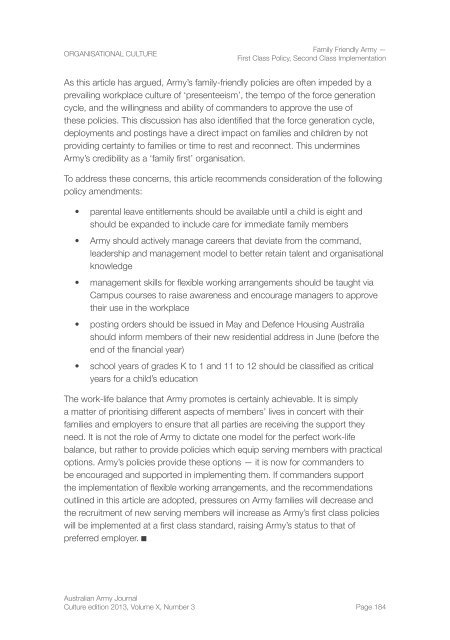Australian Army Journal
Australian Army Journal
Australian Army Journal
Create successful ePaper yourself
Turn your PDF publications into a flip-book with our unique Google optimized e-Paper software.
ORGANISATIONAL CULTURE<br />
Family Friendly <strong>Army</strong> —<br />
First Class Policy, Second Class Implementation<br />
As this article has argued, <strong>Army</strong>’s family-friendly policies are often impeded by a<br />
prevailing workplace culture of ‘presenteeism’, the tempo of the force generation<br />
cycle, and the willingness and ability of commanders to approve the use of<br />
these policies. This discussion has also identified that the force generation cycle,<br />
deployments and postings have a direct impact on families and children by not<br />
providing certainty to families or time to rest and reconnect. This undermines<br />
<strong>Army</strong>’s credibility as a ‘family first’ organisation.<br />
To address these concerns, this article recommends consideration of the following<br />
policy amendments:<br />
• parental leave entitlements should be available until a child is eight and<br />
should be expanded to include care for immediate family members<br />
• <strong>Army</strong> should actively manage careers that deviate from the command,<br />
leadership and management model to better retain talent and organisational<br />
knowledge<br />
• management skills for flexible working arrangements should be taught via<br />
Campus courses to raise awareness and encourage managers to approve<br />
their use in the workplace<br />
• posting orders should be issued in May and Defence Housing Australia<br />
should inform members of their new residential address in June (before the<br />
end of the financial year)<br />
• school years of grades K to 1 and 11 to 12 should be classified as critical<br />
years for a child’s education<br />
The work-life balance that <strong>Army</strong> promotes is certainly achievable. It is simply<br />
a matter of prioritising different aspects of members’ lives in concert with their<br />
families and employers to ensure that all parties are receiving the support they<br />
need. It is not the role of <strong>Army</strong> to dictate one model for the perfect work-life<br />
balance, but rather to provide policies which equip serving members with practical<br />
options. <strong>Army</strong>’s policies provide these options — it is now for commanders to<br />
be encouraged and supported in implementing them. If commanders support<br />
the implementation of flexible working arrangements, and the recommendations<br />
outlined in this article are adopted, pressures on <strong>Army</strong> families will decrease and<br />
the recruitment of new serving members will increase as <strong>Army</strong>’s first class policies<br />
will be implemented at a first class standard, raising <strong>Army</strong>’s status to that of<br />
preferred employer.<br />
<strong>Australian</strong> <strong>Army</strong> <strong>Journal</strong><br />
Culture edition 2013, Volume X, Number 3 Page 184

















